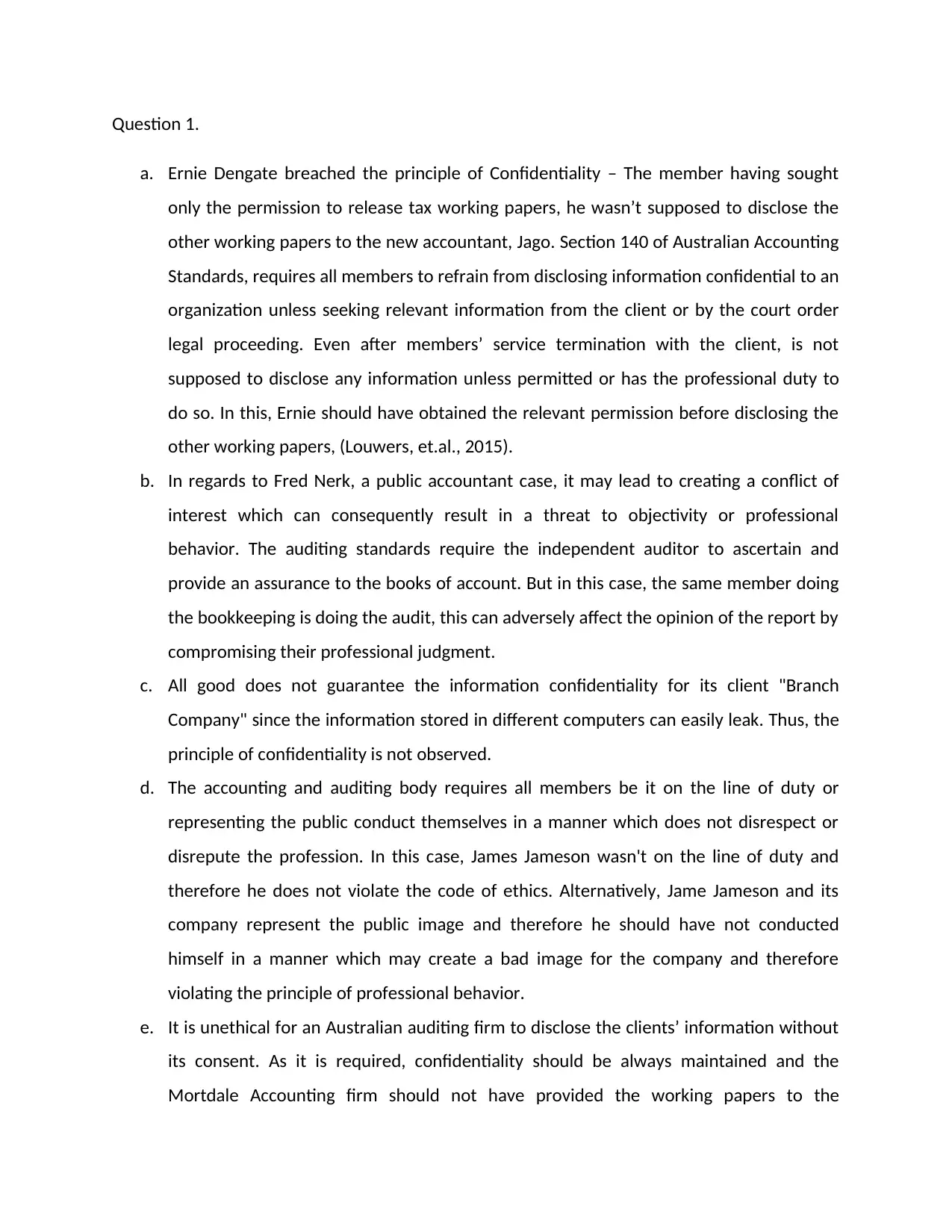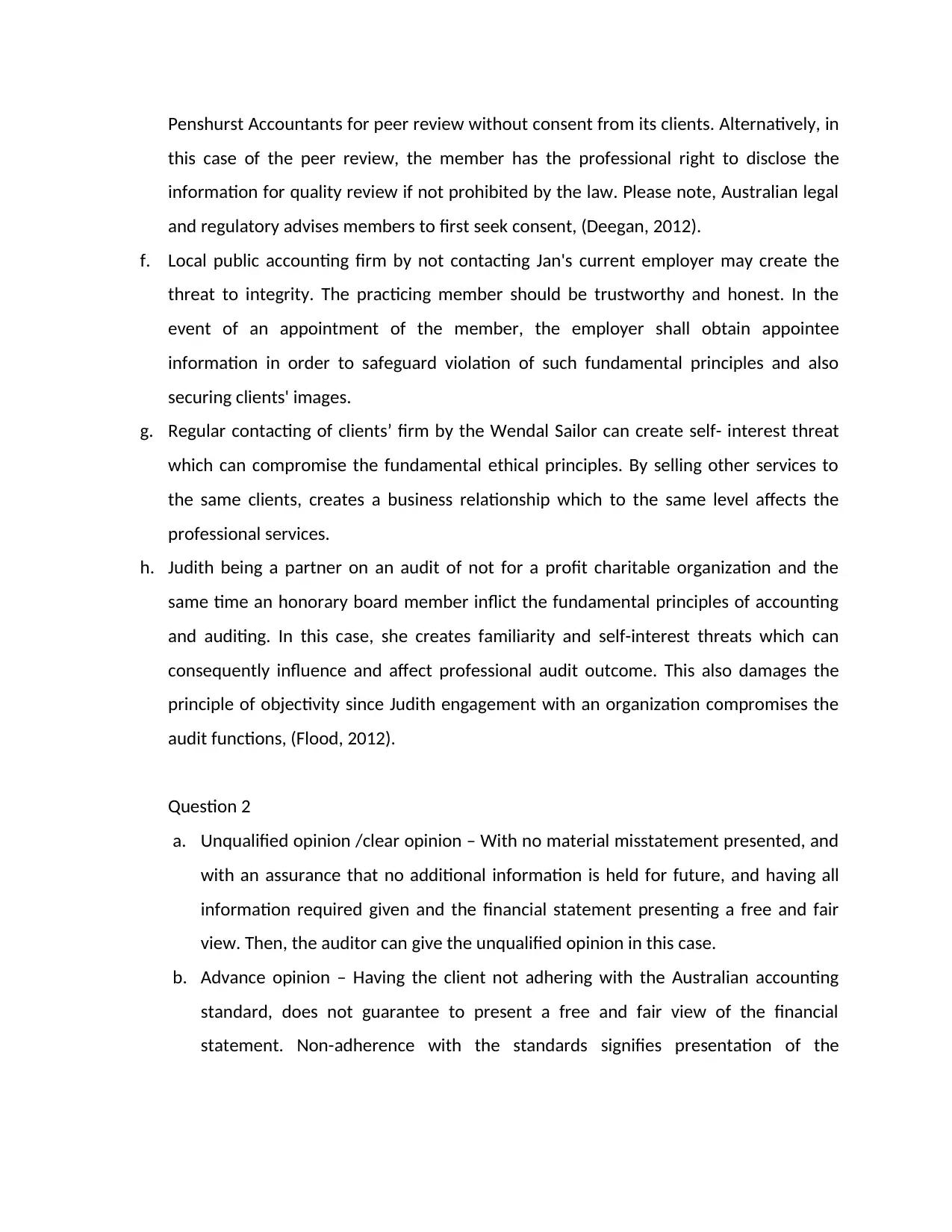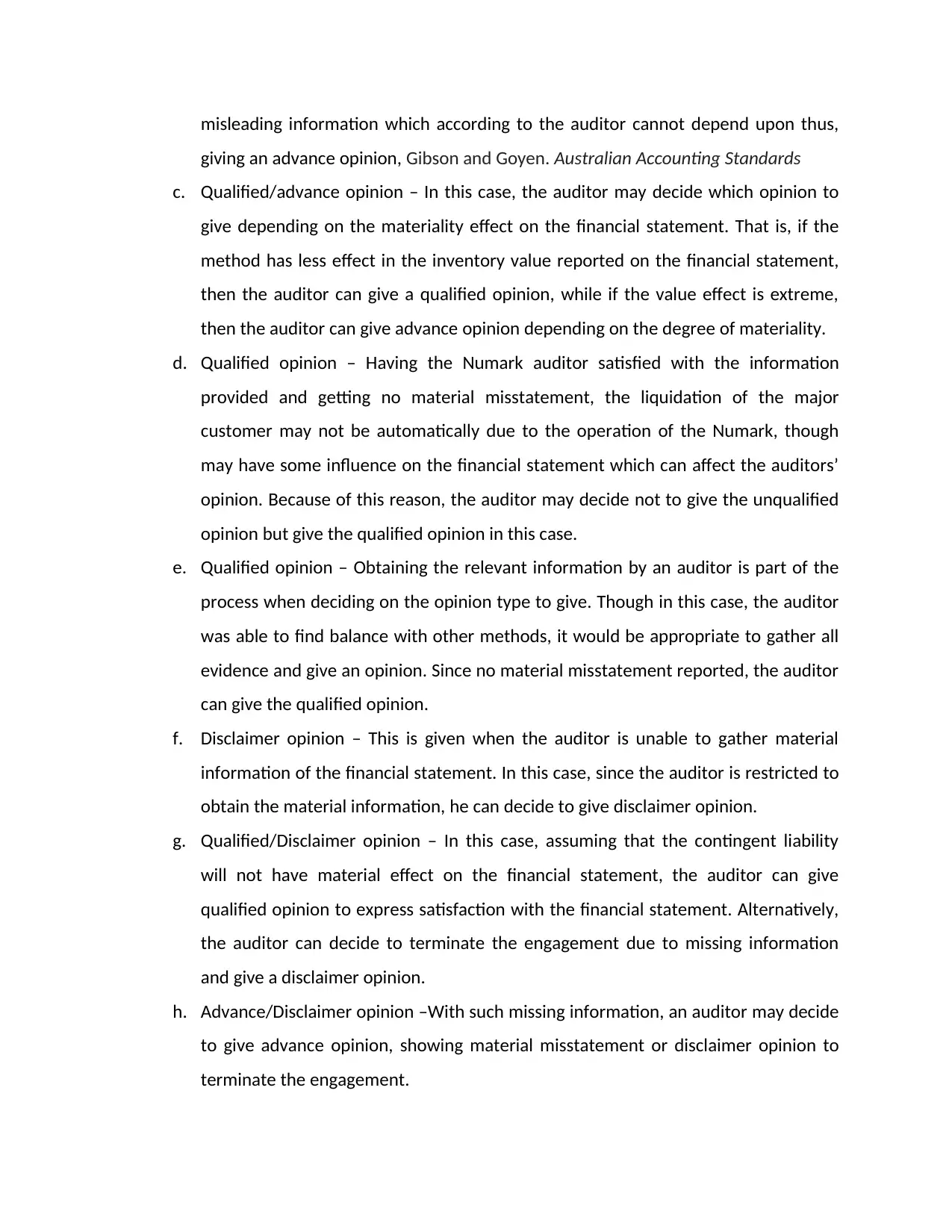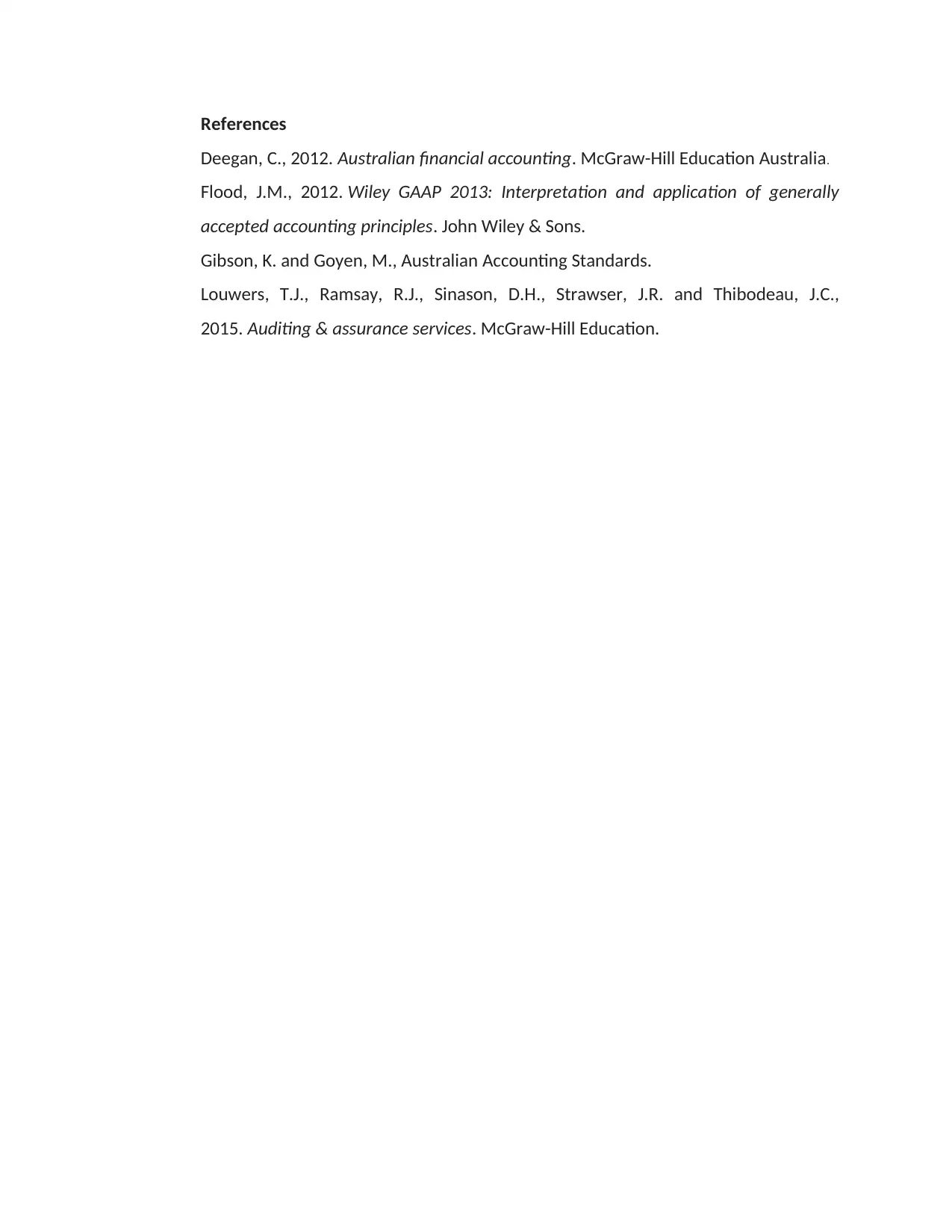Analyzing Ethical Breaches in Accounting and Auditing Practices
VerifiedAdded on 2021/12/21
|4
|1172
|342
Homework Assignment
AI Summary
This assignment delves into the ethical considerations within accounting and auditing practices, addressing several scenarios that illustrate breaches of confidentiality, conflicts of interest, and violations of professional behavior. The first part examines specific cases, such as the disclosure of working papers without permission, potential conflicts arising from performing both bookkeeping and auditing, and the implications of maintaining client confidentiality. It also explores situations where ethical principles are compromised by actions of individuals or firms, including the unauthorized sharing of client information and the creation of self-interest threats. The second part focuses on different types of audit opinions, including unqualified, qualified, and disclaimer opinions, in various scenarios where issues like non-adherence to accounting standards, the impact of material misstatements, and limitations in obtaining information arise. The assignment references relevant Australian accounting standards and ethical guidelines to support its analysis.

Question 1.
a. Ernie Dengate breached the principle of Confidentiality – The member having sought
only the permission to release tax working papers, he wasn’t supposed to disclose the
other working papers to the new accountant, Jago. Section 140 of Australian Accounting
Standards, requires all members to refrain from disclosing information confidential to an
organization unless seeking relevant information from the client or by the court order
legal proceeding. Even after members’ service termination with the client, is not
supposed to disclose any information unless permitted or has the professional duty to
do so. In this, Ernie should have obtained the relevant permission before disclosing the
other working papers, (Louwers, et.al., 2015).
b. In regards to Fred Nerk, a public accountant case, it may lead to creating a conflict of
interest which can consequently result in a threat to objectivity or professional
behavior. The auditing standards require the independent auditor to ascertain and
provide an assurance to the books of account. But in this case, the same member doing
the bookkeeping is doing the audit, this can adversely affect the opinion of the report by
compromising their professional judgment.
c. All good does not guarantee the information confidentiality for its client "Branch
Company" since the information stored in different computers can easily leak. Thus, the
principle of confidentiality is not observed.
d. The accounting and auditing body requires all members be it on the line of duty or
representing the public conduct themselves in a manner which does not disrespect or
disrepute the profession. In this case, James Jameson wasn't on the line of duty and
therefore he does not violate the code of ethics. Alternatively, Jame Jameson and its
company represent the public image and therefore he should have not conducted
himself in a manner which may create a bad image for the company and therefore
violating the principle of professional behavior.
e. It is unethical for an Australian auditing firm to disclose the clients’ information without
its consent. As it is required, confidentiality should be always maintained and the
Mortdale Accounting firm should not have provided the working papers to the
a. Ernie Dengate breached the principle of Confidentiality – The member having sought
only the permission to release tax working papers, he wasn’t supposed to disclose the
other working papers to the new accountant, Jago. Section 140 of Australian Accounting
Standards, requires all members to refrain from disclosing information confidential to an
organization unless seeking relevant information from the client or by the court order
legal proceeding. Even after members’ service termination with the client, is not
supposed to disclose any information unless permitted or has the professional duty to
do so. In this, Ernie should have obtained the relevant permission before disclosing the
other working papers, (Louwers, et.al., 2015).
b. In regards to Fred Nerk, a public accountant case, it may lead to creating a conflict of
interest which can consequently result in a threat to objectivity or professional
behavior. The auditing standards require the independent auditor to ascertain and
provide an assurance to the books of account. But in this case, the same member doing
the bookkeeping is doing the audit, this can adversely affect the opinion of the report by
compromising their professional judgment.
c. All good does not guarantee the information confidentiality for its client "Branch
Company" since the information stored in different computers can easily leak. Thus, the
principle of confidentiality is not observed.
d. The accounting and auditing body requires all members be it on the line of duty or
representing the public conduct themselves in a manner which does not disrespect or
disrepute the profession. In this case, James Jameson wasn't on the line of duty and
therefore he does not violate the code of ethics. Alternatively, Jame Jameson and its
company represent the public image and therefore he should have not conducted
himself in a manner which may create a bad image for the company and therefore
violating the principle of professional behavior.
e. It is unethical for an Australian auditing firm to disclose the clients’ information without
its consent. As it is required, confidentiality should be always maintained and the
Mortdale Accounting firm should not have provided the working papers to the
Paraphrase This Document
Need a fresh take? Get an instant paraphrase of this document with our AI Paraphraser

Penshurst Accountants for peer review without consent from its clients. Alternatively, in
this case of the peer review, the member has the professional right to disclose the
information for quality review if not prohibited by the law. Please note, Australian legal
and regulatory advises members to first seek consent, (Deegan, 2012).
f. Local public accounting firm by not contacting Jan's current employer may create the
threat to integrity. The practicing member should be trustworthy and honest. In the
event of an appointment of the member, the employer shall obtain appointee
information in order to safeguard violation of such fundamental principles and also
securing clients' images.
g. Regular contacting of clients’ firm by the Wendal Sailor can create self- interest threat
which can compromise the fundamental ethical principles. By selling other services to
the same clients, creates a business relationship which to the same level affects the
professional services.
h. Judith being a partner on an audit of not for a profit charitable organization and the
same time an honorary board member inflict the fundamental principles of accounting
and auditing. In this case, she creates familiarity and self-interest threats which can
consequently influence and affect professional audit outcome. This also damages the
principle of objectivity since Judith engagement with an organization compromises the
audit functions, (Flood, 2012).
Question 2
a. Unqualified opinion /clear opinion – With no material misstatement presented, and
with an assurance that no additional information is held for future, and having all
information required given and the financial statement presenting a free and fair
view. Then, the auditor can give the unqualified opinion in this case.
b. Advance opinion – Having the client not adhering with the Australian accounting
standard, does not guarantee to present a free and fair view of the financial
statement. Non-adherence with the standards signifies presentation of the
this case of the peer review, the member has the professional right to disclose the
information for quality review if not prohibited by the law. Please note, Australian legal
and regulatory advises members to first seek consent, (Deegan, 2012).
f. Local public accounting firm by not contacting Jan's current employer may create the
threat to integrity. The practicing member should be trustworthy and honest. In the
event of an appointment of the member, the employer shall obtain appointee
information in order to safeguard violation of such fundamental principles and also
securing clients' images.
g. Regular contacting of clients’ firm by the Wendal Sailor can create self- interest threat
which can compromise the fundamental ethical principles. By selling other services to
the same clients, creates a business relationship which to the same level affects the
professional services.
h. Judith being a partner on an audit of not for a profit charitable organization and the
same time an honorary board member inflict the fundamental principles of accounting
and auditing. In this case, she creates familiarity and self-interest threats which can
consequently influence and affect professional audit outcome. This also damages the
principle of objectivity since Judith engagement with an organization compromises the
audit functions, (Flood, 2012).
Question 2
a. Unqualified opinion /clear opinion – With no material misstatement presented, and
with an assurance that no additional information is held for future, and having all
information required given and the financial statement presenting a free and fair
view. Then, the auditor can give the unqualified opinion in this case.
b. Advance opinion – Having the client not adhering with the Australian accounting
standard, does not guarantee to present a free and fair view of the financial
statement. Non-adherence with the standards signifies presentation of the

misleading information which according to the auditor cannot depend upon thus,
giving an advance opinion, Gibson and Goyen. Australian Accounting Standards
c. Qualified/advance opinion – In this case, the auditor may decide which opinion to
give depending on the materiality effect on the financial statement. That is, if the
method has less effect in the inventory value reported on the financial statement,
then the auditor can give a qualified opinion, while if the value effect is extreme,
then the auditor can give advance opinion depending on the degree of materiality.
d. Qualified opinion – Having the Numark auditor satisfied with the information
provided and getting no material misstatement, the liquidation of the major
customer may not be automatically due to the operation of the Numark, though
may have some influence on the financial statement which can affect the auditors’
opinion. Because of this reason, the auditor may decide not to give the unqualified
opinion but give the qualified opinion in this case.
e. Qualified opinion – Obtaining the relevant information by an auditor is part of the
process when deciding on the opinion type to give. Though in this case, the auditor
was able to find balance with other methods, it would be appropriate to gather all
evidence and give an opinion. Since no material misstatement reported, the auditor
can give the qualified opinion.
f. Disclaimer opinion – This is given when the auditor is unable to gather material
information of the financial statement. In this case, since the auditor is restricted to
obtain the material information, he can decide to give disclaimer opinion.
g. Qualified/Disclaimer opinion – In this case, assuming that the contingent liability
will not have material effect on the financial statement, the auditor can give
qualified opinion to express satisfaction with the financial statement. Alternatively,
the auditor can decide to terminate the engagement due to missing information
and give a disclaimer opinion.
h. Advance/Disclaimer opinion –With such missing information, an auditor may decide
to give advance opinion, showing material misstatement or disclaimer opinion to
terminate the engagement.
giving an advance opinion, Gibson and Goyen. Australian Accounting Standards
c. Qualified/advance opinion – In this case, the auditor may decide which opinion to
give depending on the materiality effect on the financial statement. That is, if the
method has less effect in the inventory value reported on the financial statement,
then the auditor can give a qualified opinion, while if the value effect is extreme,
then the auditor can give advance opinion depending on the degree of materiality.
d. Qualified opinion – Having the Numark auditor satisfied with the information
provided and getting no material misstatement, the liquidation of the major
customer may not be automatically due to the operation of the Numark, though
may have some influence on the financial statement which can affect the auditors’
opinion. Because of this reason, the auditor may decide not to give the unqualified
opinion but give the qualified opinion in this case.
e. Qualified opinion – Obtaining the relevant information by an auditor is part of the
process when deciding on the opinion type to give. Though in this case, the auditor
was able to find balance with other methods, it would be appropriate to gather all
evidence and give an opinion. Since no material misstatement reported, the auditor
can give the qualified opinion.
f. Disclaimer opinion – This is given when the auditor is unable to gather material
information of the financial statement. In this case, since the auditor is restricted to
obtain the material information, he can decide to give disclaimer opinion.
g. Qualified/Disclaimer opinion – In this case, assuming that the contingent liability
will not have material effect on the financial statement, the auditor can give
qualified opinion to express satisfaction with the financial statement. Alternatively,
the auditor can decide to terminate the engagement due to missing information
and give a disclaimer opinion.
h. Advance/Disclaimer opinion –With such missing information, an auditor may decide
to give advance opinion, showing material misstatement or disclaimer opinion to
terminate the engagement.
⊘ This is a preview!⊘
Do you want full access?
Subscribe today to unlock all pages.

Trusted by 1+ million students worldwide

References
Deegan, C., 2012. Australian financial accounting. McGraw-Hill Education Australia.
Flood, J.M., 2012. Wiley GAAP 2013: Interpretation and application of generally
accepted accounting principles. John Wiley & Sons.
Gibson, K. and Goyen, M., Australian Accounting Standards.
Louwers, T.J., Ramsay, R.J., Sinason, D.H., Strawser, J.R. and Thibodeau, J.C.,
2015. Auditing & assurance services. McGraw-Hill Education.
Deegan, C., 2012. Australian financial accounting. McGraw-Hill Education Australia.
Flood, J.M., 2012. Wiley GAAP 2013: Interpretation and application of generally
accepted accounting principles. John Wiley & Sons.
Gibson, K. and Goyen, M., Australian Accounting Standards.
Louwers, T.J., Ramsay, R.J., Sinason, D.H., Strawser, J.R. and Thibodeau, J.C.,
2015. Auditing & assurance services. McGraw-Hill Education.
1 out of 4
Related Documents
Your All-in-One AI-Powered Toolkit for Academic Success.
+13062052269
info@desklib.com
Available 24*7 on WhatsApp / Email
![[object Object]](/_next/static/media/star-bottom.7253800d.svg)
Unlock your academic potential
Copyright © 2020–2026 A2Z Services. All Rights Reserved. Developed and managed by ZUCOL.




